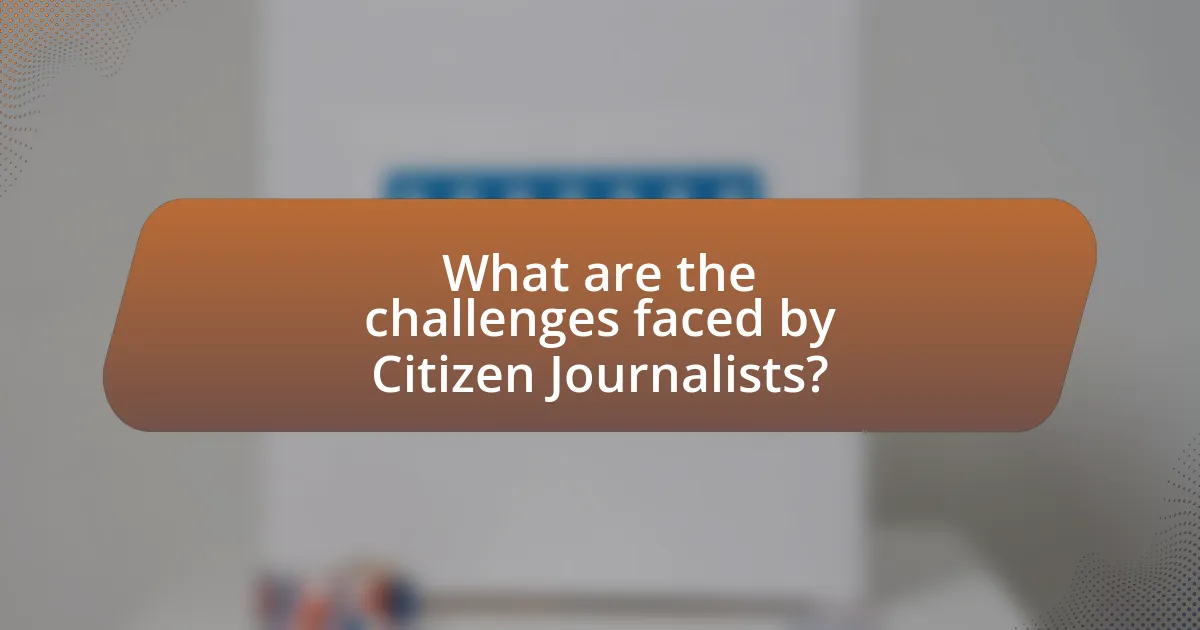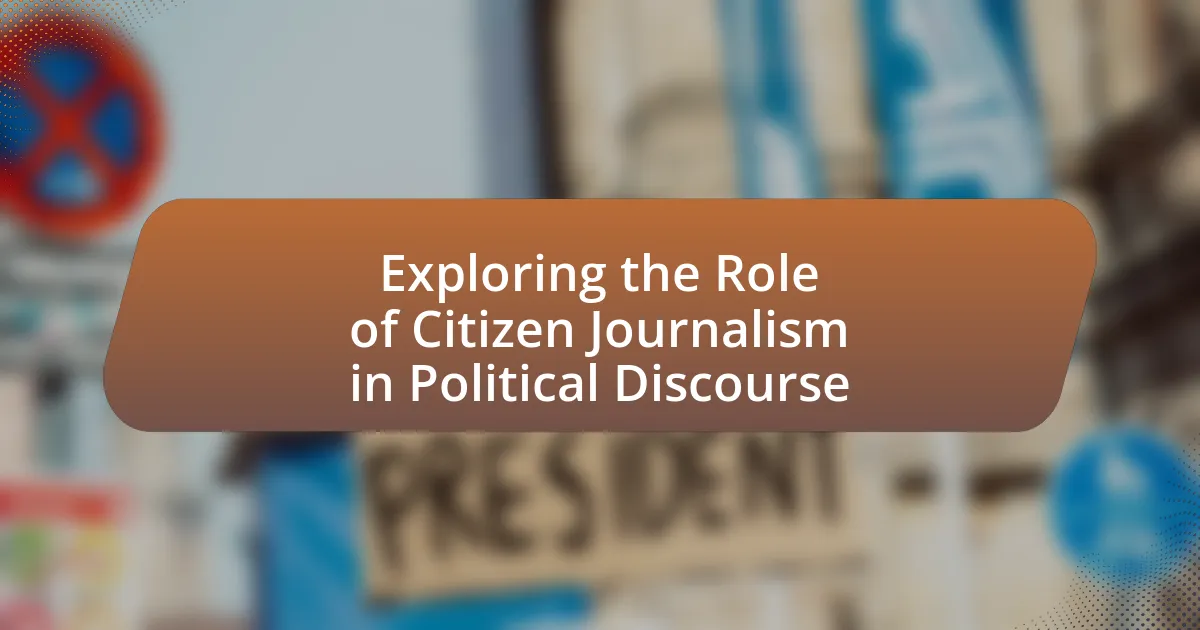Citizen journalism is the practice where individuals, often without formal training, report news and share information primarily through social media platforms. This form of journalism plays a crucial role in political discourse by providing alternative perspectives and amplifying marginalized voices, as evidenced during events like the Arab Spring. The article explores the differences between citizen and traditional journalism, the characteristics and empowerment of citizen journalists, the importance of this practice in today’s political landscape, and the challenges they face, including legal issues and misinformation. Additionally, it discusses best practices for effective citizen journalism, the impact of technology, and future trends that may shape its role in political engagement.

What is Citizen Journalism and its Role in Political Discourse?
Citizen journalism refers to the practice where individuals, often without formal training, report news and share information through various platforms, particularly social media. This form of journalism plays a significant role in political discourse by providing alternative perspectives and amplifying voices that may be marginalized in traditional media. For instance, during the Arab Spring, citizen journalists documented events in real-time, influencing global awareness and political responses. Studies, such as those by the Pew Research Center, indicate that citizen journalism can enhance democratic engagement by fostering public dialogue and accountability.
How does Citizen Journalism differ from traditional journalism?
Citizen journalism differs from traditional journalism primarily in its source and approach to news reporting. Citizen journalism involves individuals, often non-professionals, reporting news events through platforms like social media, while traditional journalism is conducted by trained professionals adhering to established editorial standards and practices. This distinction is evident in the rise of platforms like Twitter and Facebook, where ordinary citizens can share real-time updates and perspectives, often bypassing traditional media gatekeepers. According to a 2016 study published in the Journal of Communication, citizen journalism has increased public engagement in political discourse, demonstrating its impact on how news is consumed and disseminated.
What are the key characteristics of Citizen Journalism?
Citizen journalism is characterized by its grassroots nature, where ordinary individuals report news and share information, often using digital platforms. This form of journalism emphasizes immediacy, as citizen journalists can quickly disseminate information in real-time, especially during events like protests or natural disasters. Additionally, citizen journalism promotes inclusivity, allowing diverse voices and perspectives that traditional media may overlook. The accessibility of technology, such as smartphones and social media, empowers individuals to document and share their experiences, contributing to a more democratized media landscape. Studies indicate that citizen journalism can enhance public engagement and accountability, as it often highlights issues relevant to local communities that may not receive coverage from mainstream outlets.
In what ways does Citizen Journalism empower individuals?
Citizen journalism empowers individuals by providing them with the tools and platforms to share their perspectives and report on issues that matter to them. This form of journalism democratizes information dissemination, allowing ordinary people to contribute to public discourse and hold authorities accountable. For instance, during events like the Arab Spring, citizen journalists used social media to document protests and human rights abuses, significantly influencing global awareness and response. By bypassing traditional media gatekeepers, individuals can amplify their voices and foster community engagement, thus enhancing civic participation and promoting transparency in political processes.
Why is Citizen Journalism important in today’s political landscape?
Citizen journalism is important in today’s political landscape because it democratizes information dissemination and empowers individuals to report on events and issues that mainstream media may overlook. This form of journalism allows for diverse perspectives, particularly from marginalized communities, to be shared, thereby enhancing public discourse. For instance, during the Arab Spring, citizen journalists played a crucial role in documenting protests and government responses, which traditional media often failed to cover comprehensively. This real-time reporting can influence public opinion and policy decisions, highlighting the significance of citizen journalism in shaping political narratives and accountability.
How does Citizen Journalism influence public opinion?
Citizen journalism significantly influences public opinion by providing alternative narratives and immediate reporting that traditional media may overlook. This form of journalism empowers individuals to share firsthand accounts and perspectives, often highlighting issues of local or social importance that resonate with communities. For instance, during events like protests or natural disasters, citizen journalists can disseminate real-time information through social media platforms, shaping public perception and mobilizing support. Research indicates that citizen-generated content can lead to increased engagement and awareness, as seen in the Arab Spring, where citizen journalism played a crucial role in informing the global audience and influencing political discourse.
What role does social media play in Citizen Journalism?
Social media serves as a crucial platform for citizen journalism by enabling individuals to share news and information rapidly and widely. This democratization of information allows ordinary citizens to report events, express opinions, and engage in discussions that traditional media may overlook. For instance, during significant events like protests or natural disasters, social media users can provide real-time updates and firsthand accounts, often reaching larger audiences than conventional news outlets. According to a Pew Research Center study, 64% of Americans believe social media is a valuable source for news, highlighting its impact on public discourse and the dissemination of information.

What are the challenges faced by Citizen Journalists?
Citizen journalists face several challenges, including lack of resources, legal risks, and credibility issues. The absence of institutional support often limits their access to training, funding, and technology, which can hinder the quality of their reporting. Legal risks arise from potential harassment, threats, or legal action from authorities or individuals who may disagree with their coverage, as seen in various cases where citizen journalists have faced intimidation. Additionally, credibility issues stem from the perception that citizen journalism lacks the rigorous standards of traditional media, making it difficult for them to gain trust among audiences. These challenges collectively impact the effectiveness and safety of citizen journalists in contributing to political discourse.
How do legal issues impact Citizen Journalism?
Legal issues significantly impact citizen journalism by imposing constraints on the freedom to report and share information. These constraints arise from laws related to defamation, copyright, privacy, and national security, which can lead to legal repercussions for citizen journalists. For instance, in many jurisdictions, citizen journalists may face lawsuits for defamation if they publish unverified claims about individuals or organizations, which can deter them from reporting controversial topics. Additionally, copyright laws can restrict the use of images or videos taken by citizen journalists, limiting their ability to provide comprehensive coverage. Furthermore, privacy laws may prevent citizen journalists from disclosing certain information without consent, thereby hindering their investigative efforts. Overall, these legal frameworks create a challenging environment for citizen journalists, affecting their ability to contribute to political discourse effectively.
What are the risks of misinformation in Citizen Journalism?
Misinformation in citizen journalism poses significant risks, including the spread of false narratives, erosion of public trust, and potential harm to individuals and communities. False narratives can lead to misinformed public opinions and decisions, as seen in instances where inaccurate reporting influenced political events, such as the misinformation surrounding the 2016 U.S. presidential election. Erosion of public trust occurs when audiences cannot differentiate between credible and non-credible sources, leading to skepticism towards all media. Additionally, misinformation can result in real-world consequences, such as inciting violence or damaging reputations, as evidenced by cases where erroneous reports have led to public outrage or harm to individuals.
How can Citizen Journalists protect themselves from legal repercussions?
Citizen journalists can protect themselves from legal repercussions by understanding and adhering to local laws regarding defamation, privacy, and copyright. Familiarity with these laws enables them to avoid legal pitfalls, as ignorance of the law is not a valid defense in court. Additionally, citizen journalists should consider obtaining liability insurance, which can provide financial protection in case of lawsuits. Engaging in ethical reporting practices, such as verifying information before publication and providing context, can also mitigate risks. Furthermore, documenting sources and maintaining transparency about their reporting methods can strengthen their legal position. These strategies are supported by legal experts who emphasize the importance of awareness and preparation in the field of journalism.
What ethical considerations should Citizen Journalists keep in mind?
Citizen journalists should prioritize accuracy, fairness, and respect for privacy in their reporting. Accuracy ensures that the information shared is truthful and reliable, which is crucial in maintaining credibility and trust among audiences. Fairness involves presenting multiple viewpoints and avoiding bias, which is essential in political discourse to foster informed discussions. Respect for privacy means being mindful of individuals’ rights and the potential consequences of exposing personal information, especially in sensitive situations. These ethical considerations are vital for citizen journalists to uphold the integrity of their contributions to political discourse.
How do biases affect the reporting of Citizen Journalists?
Biases significantly affect the reporting of Citizen Journalists by influencing the selection of stories, framing of narratives, and interpretation of events. Citizen Journalists often bring personal perspectives and experiences to their reporting, which can lead to subjective portrayals that may not fully represent the facts. For instance, a study by the Pew Research Center found that individuals’ political affiliations can shape their news consumption and reporting, resulting in a tendency to highlight information that aligns with their beliefs while downplaying opposing viewpoints. This selective reporting can distort public perception and contribute to polarization in political discourse.
What standards should Citizen Journalists adhere to for credibility?
Citizen journalists should adhere to standards of accuracy, transparency, and ethical reporting to establish credibility. Accuracy involves verifying facts before publication, ensuring that information is correct and reliable. Transparency requires disclosing sources and potential conflicts of interest, which builds trust with the audience. Ethical reporting includes respecting privacy, avoiding sensationalism, and providing balanced perspectives. These standards are supported by the Society of Professional Journalists’ Code of Ethics, which emphasizes the importance of truth and accountability in journalism.

How can Citizen Journalism enhance political engagement?
Citizen journalism enhances political engagement by empowering individuals to report news and share perspectives that mainstream media may overlook. This grassroots approach allows for diverse viewpoints, fostering a more inclusive political discourse. For instance, during the Arab Spring, citizen journalists played a crucial role in documenting protests and government responses, which significantly influenced global awareness and political action. By providing real-time information and facilitating dialogue, citizen journalism encourages active participation in political processes, ultimately leading to a more informed and engaged citizenry.
What strategies can Citizen Journalists use to engage their audience?
Citizen journalists can engage their audience by utilizing social media platforms to share real-time updates and foster interactive discussions. By leveraging platforms like Twitter and Facebook, citizen journalists can reach a wider audience, encourage feedback, and create a sense of community around their reporting. Research indicates that 72% of adults use social media to get news, highlighting the effectiveness of these platforms in engaging audiences. Additionally, incorporating multimedia elements such as videos and infographics can enhance storytelling and capture attention, making the content more relatable and shareable.
How can storytelling techniques improve the impact of Citizen Journalism?
Storytelling techniques can significantly enhance the impact of Citizen Journalism by making narratives more relatable and engaging for audiences. When citizen journalists employ storytelling elements such as character development, emotional appeal, and structured plots, they can effectively capture the attention of their audience, fostering a deeper connection to the issues being reported. For instance, a study by the Pew Research Center found that stories with personal anecdotes and emotional resonance are more likely to be shared and discussed, thereby amplifying their reach and influence in political discourse. This increased engagement can lead to greater awareness and mobilization around social and political issues, ultimately strengthening the role of citizen journalism in shaping public opinion and discourse.
What role does community involvement play in Citizen Journalism?
Community involvement is essential in citizen journalism as it empowers individuals to report on local issues, fostering a more inclusive media landscape. This grassroots participation enhances the diversity of perspectives and information available to the public, which is crucial for informed political discourse. For instance, studies have shown that citizen journalists often cover stories overlooked by traditional media, thereby addressing community-specific concerns and amplifying marginalized voices. This active engagement not only enriches the content produced but also strengthens community ties and encourages civic participation, ultimately contributing to a more vibrant democratic process.
What are the best practices for effective Citizen Journalism?
The best practices for effective Citizen Journalism include verifying information before publication, maintaining objectivity, and utilizing multiple sources. Verifying information ensures accuracy and builds credibility, as seen in cases where citizen journalists have uncovered significant events, such as the Arab Spring, where social media played a crucial role in disseminating verified information. Maintaining objectivity helps to present facts without bias, which is essential for fostering trust among audiences. Utilizing multiple sources enhances the reliability of the information shared, as corroborating evidence from various perspectives can provide a more comprehensive view of events. These practices collectively contribute to the integrity and impact of citizen journalism in political discourse.
How can Citizen Journalists verify their sources?
Citizen journalists can verify their sources by cross-referencing information with multiple credible outlets and utilizing fact-checking websites. This method ensures that the information is corroborated by independent sources, which enhances its reliability. For instance, organizations like Snopes and FactCheck.org provide tools for verifying claims and debunking misinformation. Additionally, citizen journalists should assess the credibility of the source by examining the author’s qualifications, the publication’s reputation, and the presence of supporting evidence. This approach is crucial in maintaining journalistic integrity and providing accurate information in political discourse.
What tools and platforms are available for Citizen Journalists?
Citizen journalists have access to various tools and platforms that facilitate their reporting and dissemination of information. Notable platforms include social media networks like Twitter and Facebook, which allow for real-time sharing of news and updates. Additionally, blogging platforms such as WordPress and Medium enable citizen journalists to publish articles and opinion pieces. Mobile applications like Signal and WhatsApp provide secure communication channels for sharing information and coordinating efforts. Furthermore, video-sharing platforms like YouTube and TikTok allow for the creation and distribution of video content, enhancing storytelling capabilities. These tools collectively empower citizen journalists to engage in political discourse and contribute to public dialogue.
What future trends can we expect in Citizen Journalism and political discourse?
Future trends in citizen journalism and political discourse will likely include increased reliance on digital platforms for news dissemination and a rise in participatory engagement from the public. As social media continues to evolve, citizen journalists will utilize these platforms to report real-time events, thereby influencing political narratives and public opinion. According to a 2021 Pew Research Center study, 53% of Americans reported getting news from social media, highlighting the growing importance of these channels in shaping political discourse. Additionally, advancements in technology, such as AI and data analytics, will enable citizen journalists to fact-check information more efficiently, enhancing the credibility of their reporting. This shift towards digital engagement and technological integration will redefine the landscape of political discourse, making it more inclusive and immediate.
How might technology shape the future of Citizen Journalism?
Technology will significantly shape the future of citizen journalism by enhancing accessibility, immediacy, and the ability to disseminate information widely. The proliferation of smartphones and social media platforms allows individuals to report news in real-time, as evidenced by events like the Arab Spring, where citizen journalists played a crucial role in documenting protests and government responses. Additionally, advancements in artificial intelligence and data analytics can help citizen journalists verify information and analyze trends, improving the credibility and impact of their reporting. The rise of decentralized platforms also empowers citizens to bypass traditional media gatekeepers, fostering a more diverse range of voices in political discourse.
What potential developments could enhance the role of Citizen Journalism in politics?
Potential developments that could enhance the role of Citizen Journalism in politics include advancements in technology, increased access to information, and improved training for citizen journalists. Technology, such as mobile reporting apps and social media platforms, allows individuals to share news instantly, reaching wider audiences. Increased access to information through open data initiatives empowers citizens to investigate and report on political issues more effectively. Furthermore, training programs focused on journalistic ethics and fact-checking can improve the credibility and reliability of citizen journalism, as seen in initiatives like the Trust Project, which aims to enhance transparency in news reporting. These developments collectively strengthen the impact of citizen journalism in political discourse.
